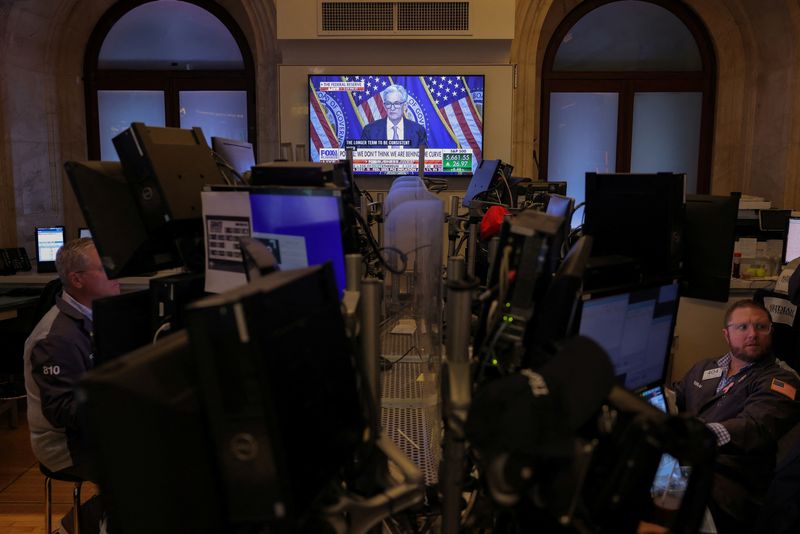Indexes fall as Iran launches missiles at Israel; defense stocks up
By Caroline Valetkevitch
NEW YORK (Reuters) -U.S. stocks fell, with the Nasdaq losing more than 1%, on Tuesday as investors grew more cautious after Iran fired missiles at Israel.
Iran launched the salvo of ballistic missiles in retaliation for Israel's campaign against Tehran's Hezbollah allies. In response, U.S. President Joe Biden directed the U.S. military to aid Israel's defense and shoot down missiles aimed at Israel, the White House National Security Council said.
While the broader market fell, shares of energy companies rose along with oil prices. Exxon Mobil (NYSE:XOM ) was up 2.2%.
Defense stocks also rose, including Northrop Grumman (NYSE:NOC ) and Lockheed Martin (NYSE:LMT ). The S&P 500 aerospace and defense index climbed more than 1% to a record high. Utilities were up 0.7%.
Airline shares fell, including Delta Air Lines (NYSE:DAL ), which was down 1%.
"This highlights the circumstance of this market in the fact that there are a myriad of risks out there, whether that's slowing employment in the U.S., the geopolitical tensions in Ukraine, the Middle East," said Walter Todd, chief investment officer at Greenwood Capital in Greenwood South Carolina.
"And the market seems very mispriced for any flare-up of any of those risks. ... It's vulnerable to shocks like this."
On Monday, the three major U.S. indexes scored strong gains for September and for the quarter.
The Dow Jones Industrial Average fell 83.68 points, or 0.2%, to 42,246.47. The S&P 500 lost 43.34 points, or 0.75%, at 5,719.14 and the Nasdaq Composite dropped 244.42 points, or 1.34%, to 17,944.75.
CBOE's market volatility index, Wall Street's fear gauge, jumped 2 points to 18.74 after hitting a three-week high of 20.73 earlier in the session.
Data released early on Tuesday showed U.S. job openings rebounded in August, while the Institute for Management Supply's (ISM) report showed manufacturing activity stood at 47.2 in September, versus estimates of 47.5.
Investors were also cautious ahead of U.S. jobless claims data on Thursday and monthly payrolls on Friday.
Traders are pricing in a 62.2% probability that the Federal Reserve will lower rates by 25 bps at its November meeting, the CME Group's (NASDAQ:CME ) FedWatch Tool showed. Bets on a bigger 50 bps cut stand at 37.8%.
Investors also were keeping an eye on a port strike on the East Coast and the Gulf Coast, halting the flow of about half the nation's ocean shipping.
The strike that began on Tuesday is not expected to cause global supply problems as deep or severe as during the COVID-19 pandemic, but it still creates more economic uncertainty for Fed policymakers to assess.
Declining issues outnumbered advancers on the NYSE by a 1.36-to-1 ratio; on Nasdaq, a 2.53-to-1 ratio favored decliners.
The S&P 500 posted 51 new 52-week highs and two new lows; the Nasdaq Composite recorded 60 new highs and 118 new lows.
Source: Investing.com
